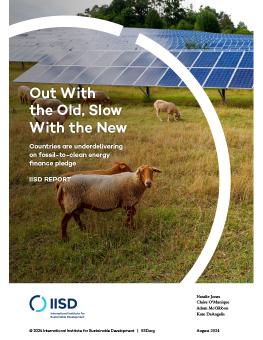
Out With the Old, Slow With the New
Countries are underdelivering on fossil-to-clean energy finance pledge
This report analyzes the progress made by Clean Energy Transition Partnership (CETP) signatories on shifting international public finance away from fossil fuels and into clean energy. It finds that although significant progress has been made on cutting finance for fossil fuels, signatories are not increasing renewable investment at the same scale.
-
NEW REPORT: CETP signatories have largely met #StopFundingFossils pledge, with international public finance for fossil fuels dropping by up to two thirds in 2023.
-
While CETP signatories have significantly reduced their fossil fuel financing, they are not increasing renewable investment at the same scale. Clean energy finance increased by just 16% in 2023.
-
To realize the CETP's transformative potential, new policies are needed to boost clean energy financing. All high-income signatories need to review and update their policies!
At the United Nations Climate Change Conference (COP) in November 2021, 39 countries and public finance institutions signed the Clean Energy Transition Partnership (CETP), a joint commitment to end international public finance for fossil fuels by the end of 2022 and prioritize international public finance for clean energy. With Norway and Australia joining at COP 28, the partnership now totals 41.
This report analyzes CETP signatories' finance for fossil fuels and clean energy, a year after the implementation deadline. It also looks at signatories' policies for fossil fuel and clean energy finance. It finds:
- Most CETP signatories have eliminated or considerably reduced their international fossil fuel financing. Collectively, signatories cut their international public finance for fossil fuels by up to two thirds since signing the agreement, to USD 5.2 billion in 2023.
- However, while signatories have significantly reduced their fossil fuel financing, they are not increasing renewable investment at the same scale. In 2023, CETP members delivered USD 21.3 billion in clean energy, an increase of just 16% from the pre-CETP baseline.
- The reduction in fossil fuel financing is supported by robust policies adopted by nearly all CETP members. However, some CETP members either failed to update their policies (Portugal, the United States) or partially restricted fossil fuel finance but left big loopholes (Switzerland, Italy).
- All signatories have more work to do to align their clean energy financing policies with the ambition of the CETP. Signatories particularly need to adopt ambitious and quantitative targets for rapidly scaling up finance for clean energy, commit to a high standard for the quality of this financing, as well as prioritize financing for key enabling energy subsectors and for the countries that need it most.
This report recommends that CETP signatories meet the CETP commitment to rapidly end international public finance for fossil fuels, adopt ambitious and quantitative targets for rapidly scaling up good-quality public finance for clean energy, provide clean energy finance on fair terms and for those most in need, and update their national and institutional policies and strategies to prioritize international support for clean energy.
Participating experts
You might also be interested in
December 2024 | Carbon Minefields Oil and Gas Exploration Monitor
In November 2024, 23 oil and gas exploration licences were awarded across five countries, with Russia granting the licences that account for the largest portion of embodied emissions.
Powering the Clean Energy Transition: Net-Zero electricity in Canada
This brief explains how a shift to clean power generation can offer affordable, reliable electricity, benefiting households and businesses alike.
November 2024 | Carbon Minefields Oil and Gas Exploration Monitor
In October 2024, 20 oil and gas exploration licences were awarded across three countries, with a significant portion granted by Brazil.
Unlocking Supply Chains for Localizing Electric Vehicle Battery Production in India
This study aims to highlight the key supply chain barriers in localizing electric vehicle (EV) battery cell manufacturing in India. It summarizes consultations with 12 companies, as well as experts and policy-makers, to determine the crucial challenges and opportunities in localizing battery manufacturing in India.